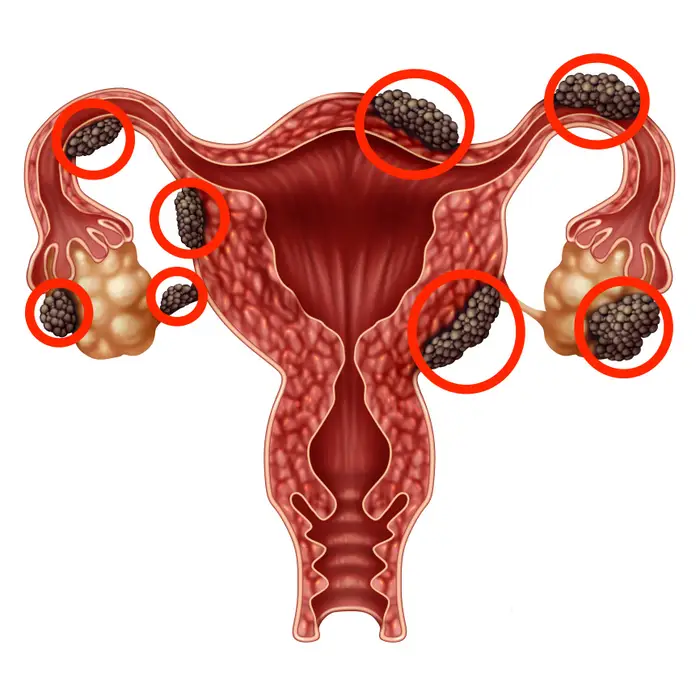
Endometriosis
Endometriosis is complex and often misunderstood medical condition that affects millions of women worldwide. Despite its prevalence, many people remain unaware of what endometriosis truly entails, how it impacts daily life, and the available treatment options. This comprehensive guide will delve into every aspect of endometriosis, from its definition and symptoms to diagnosis, treatment, and lifestyle management. By the end of this article, you will have a thorough understanding of endometriosis and how to navigate life with this condition.
What is Endometriosis?
Endometriosis is a chronic condition where tissue similar to the lining of the uterus, known as the endometrium, grows outside the uterus. This tissue can implant itself on organs such as the ovaries, fallopian tubes, bladder, and even the intestines. Unlike the endometrial tissue inside the uterus, which sheds during menstruation, the tissue outside the uterus has no way to exit the body. As a result, it becomes trapped, leading to inflammation, scarring, and the formation of adhesions.
Moreover, endometriosis is not just a physical condition; it can also have profound emotional and psychological effects. Women with endometriosis often experience chronic pain, fatigue, and challenges with fertility, which can significantly impact their quality of life.
Causes and Risk Factors of Endometriosis
Although endometriosis’ precise cause is unknown, there have been a number of proposed theories. Retrograde menstruation, or the backward flow of menstrual blood into the pelvic cavity rather than out of the body, is one such theory commonly accepted. The backward flow has the capability of depositing endometrial cells outside the uterus, where they grow and take hold.
Also, hereditary factors have a great contribution to the causation of endometriosis. Women whose family members are affected by endometriosis are likely to develop the disease themselves. Abnormalities in hormones, more so high estrogen levels, also contribute to the development of endometrial growth outside the uterus.
- Premature onset of menstruation
- Brief menstrual periods (less than 27 days)
- Heavy and prolonged menstrual bleeding for over seven days
- Having never given birth
- Structural defects in the reproductive organs
Symptoms of Endometriosis
- Pelvic Pain: Persistent pain in the lower abdomen, often worsening during menstruation.
- Painful Periods: Severe cramping that interferes with daily activities.
- Pain During Intercourse: Discomfort , pain during or after sex.
- Heavy Menstrual Bleeding: Excessive bleeding during periods.
- Infertility: Difficulty conceiving due to endometrial growths affecting reproductive organs.
Diagnosis of Endometriosis in Nagpur
- Pelvic Exam: A physical examination check for abnormalities.
- Ultrasound: Imaging tests to detect cysts or growths.
- MRI: Detailed imaging to assess the extent of endometrial growth.
- Laparoscopy: A minimally invasive surgery to confirm the diagnosis.
Treatment Options for Endometriosis
- Medications: Pain relievers and hormonal therapies to manage symptoms.
- Surgery: Laparoscopic surgery to remove endometrial growths.
- Fertility Treatments: Assisted reproductive technologies for women facing infertility.
- Alternative Therapies: Yoga, acupuncture, and dietary changes to complement medical treatment.
Lifestyle Changes to Manage Endometriosis
- Healthy Diet: Include foods with anti-inflammatory properties such as fruits, vegetables, and whole grains.
- Regular Exercise: Regular exercise can help alleviate pain and overall health.
- Stress Management: Engage in mindfulness, meditation, or yoga to lower stress levels.
- Adequate Sleep: Get 7-8 hours of sleep to promote hormonal balance.
Causes and Risk Factors
- Retrograde Menstruation: Menstrual blood travels in the opposite direction into the pelvic cavity rather than out of the body.
- Genetic Factors: Having a family history of endometriosis raises the risk.
- Hormonal Imbalances: High levels of estrogen may stimulate endometrial growth.
- Immune System Disorders: An impaired immune system might not be able to destroy abnormal tissue growth.Contact Us
Conclusion
Endometriosis is a challenging condition, but with the right care and treatment, women in Nagpur can lead healthy and fulfilling lives. By raising awareness and seeking timely medical intervention, it is possible to manage symptoms and improve quality of life. If you or someone you know is experiencing symptoms of endometriosis, consult a specialist in Nagpur today..Schedule your Consultation with Dr. Ritesh Nawkhare
